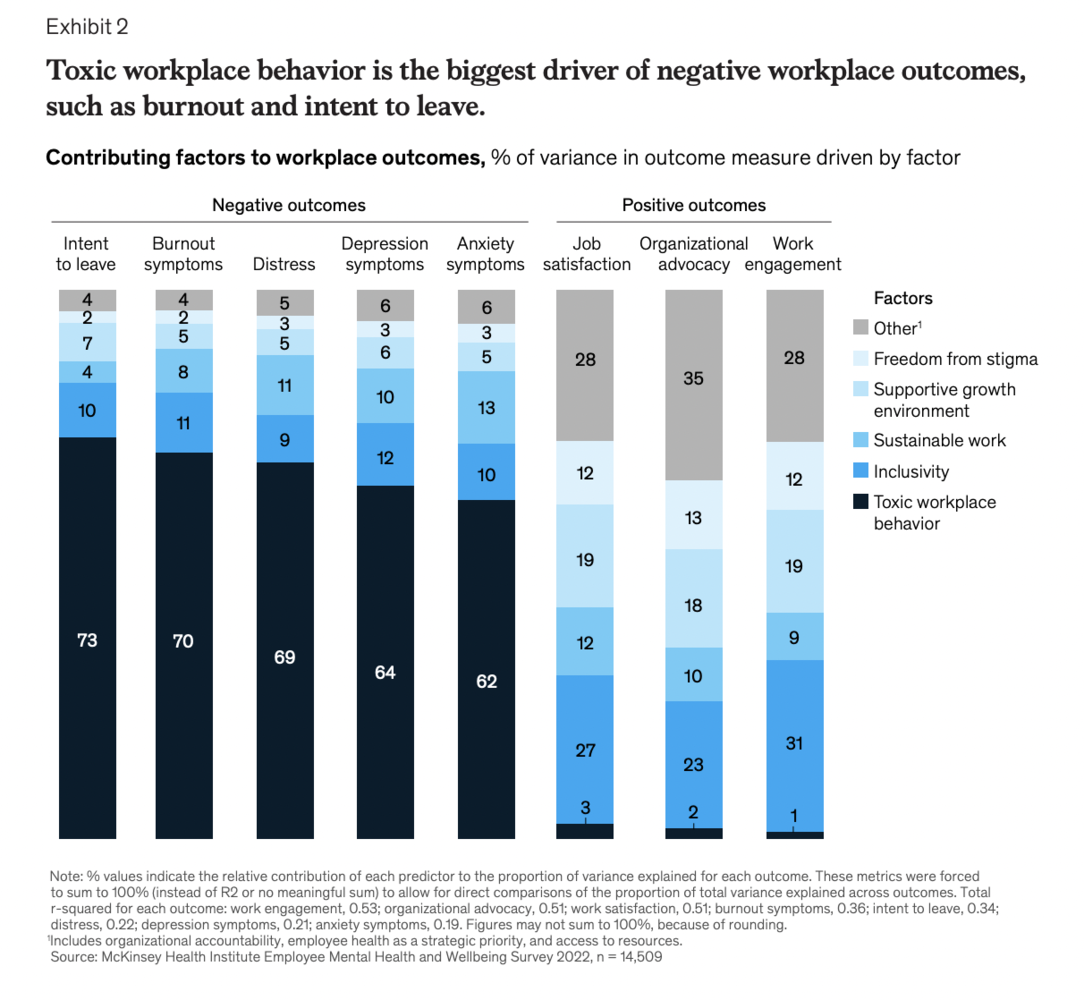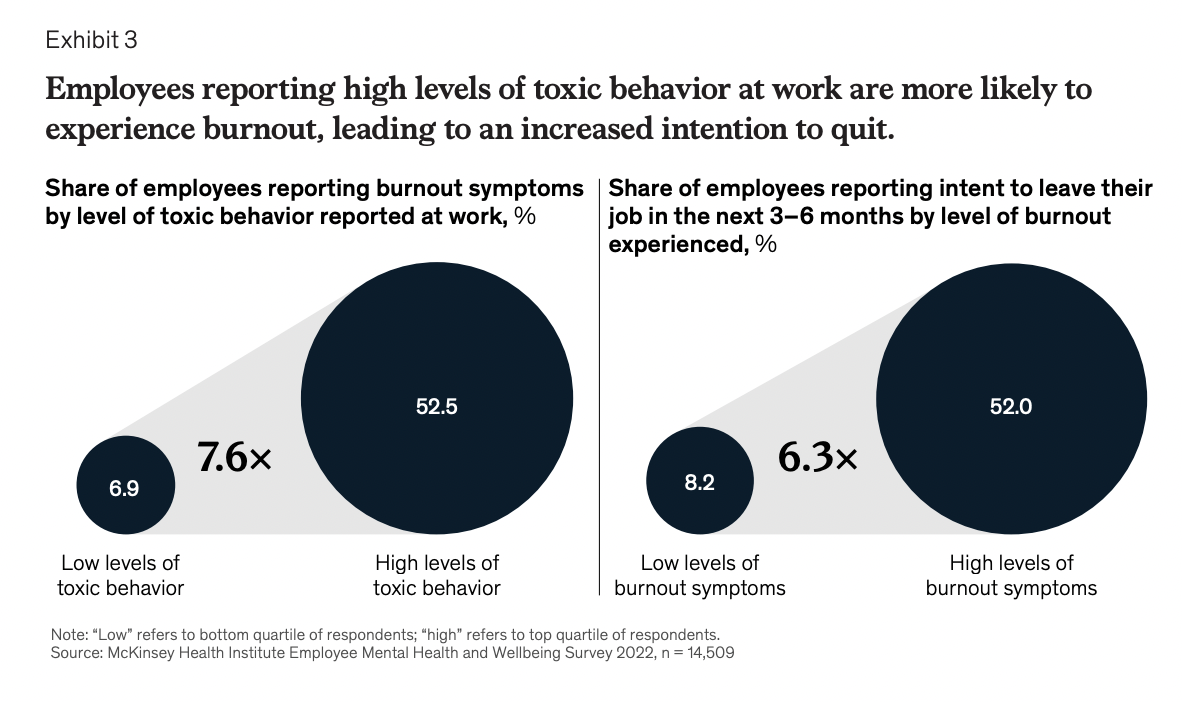Selling feels harder than ever.
Gartner research shows that 89% of B2B sellers feel burned out, and as many as 54% are actively looking for a new job.
I meet many leaders who witness employees mentally checking out, just doing the bare minimum to get by.
It might not seem like a huge deal to begin with.
But it's a problem that will grow exponentially.
The downturn is closing up on us like that person who purposely drives four inches behind our car. One break, and bang.
It may "only" be plummeting productivity, motivation and results right now. But what if shit hits the fan?
Are you confident your team will go the extra mile when times get really tough? When you depend on them for the business to survive?
If not, I encourage you to keep reading.
"Motivation will almost always beat mere talent." - Norman Ralph Augustin
It's not binary
The economy will face drastic consequences if GDP goes down by 5%.
So will larger companies.
It's tough for a €1billion to cover up for a disappearing market.
But if you're running a small or mid-sized company like Upsales, you're in the clear.
I think about it like this:
Upsales' revenue is around €13M. If we want to grow by 30%, we need to find business around €4M. Let's say 10.000 deals were made in the past year within our niche. If the economy slows down, that number won't drop to zero.
Say the number of deals decreases by 40% to 6000 in a worst-case scenario. To reach our growth targets, we need to find around 100 deals - and finding that out of 6000 is definitely possible.
It's important to remember that very few companies are so niched at €20M, that they own the entire market. So, unless you're the exception or a global giant, your chances are pretty good to successfully make it out of the crisis with some effort.
5 reasons your sales team isn't motivated, and what to do about it
Over the years, I've found many reasons sales teams or individual executives get unmotivated. Acting early can help you prevent poor results before they become unmanageable.
Reason #1: Your team is making excuses - Hold them accountable
Even if you don't want to go to the gym every morning, you get up and do it. The same goes for work; sometimes, we must remind sales executives about that.
Whatever you do - don't let the economic conditions become a standard excuse for poor results. We need to keep the team accountable. Otherwise, they'll point the finger elsewhere.
There will always be external circumstances; sometimes they're great, and other times not. We need to operate no matter what.
If you're struggling with a team that makes excuses, try evolving their mindset and helping them see how to regain personal control. A great piece on personal responsibility is the book Extreme ownership by Jocko Willink. Selling when no one is buying by Stephen Shiffman is also a godsend in times like these. Recommend it to them!
It's empowering to see the revived motivation of sales executives who realise they can stop being victims of the circumstance and start acting from the conditions they have. A positive and solution-oriented mindset gets you a long way.
"If you can't fly, then run, if you can't run then walk if you can't walk then crawl, but whatever you do you have to keep moving forward" - Martin Luther King, Jr
Reason #2: "You don't get it!" -> Walk the talk
Research shows that 67% of B2B sellers feel leadership is overly optimistic and disconnected from seller reality. If your sales team express feelings of you not "getting it", it might be time to walk the talk.
From a leadership perspective, getting your hands dirty from time to time can be highly beneficial - especially when prerequisites have shifted much. I've done it myself several times.
Is your team complaining about getting shitty leads? Take 20 and look them through and communicate your sincere opinion.
Is your team complaining about not getting any leads at all? Remind them that the essence of sales is to find deals, not to get them served, and show them how.
Is it impossible to book meetings right now? Make a few cold calls and see if you can schedule some bookings.
Doing the work signals that you see reality for what it is. It's also an excellent opportunity for coaching and revising pitches that have become outdated. If you can prove that things are possible, sales executives are less likely to consider your expectations unrealistic which refuels motivation.
Reason #3: You let bad behaviour slip by - Say goodbye once and for all
Nothing can suck the life out of an entire team as quickly as a toxic colleague. According to McKinsey, toxic workplace behaviours are the biggest driver of negative workplace outcomes, such as burnout, intent to leave and distress.


McKinsey. Addressing employee burnout: Are you solving the right problem? May 2022.
As much as one in four employees experience high rates of toxic behaviour at work.
For leaders, it's critical, not to look the other way. An economic downturn will put extra pressure on the team, and if you still need to get rid of behaviours like these, it's high time to do so. Otherwise, you'll be risking your best employees.
At Upsales, we’re never ok with bad attitudes, regardless of performance.
Reason #4: They don't know how to improve - Provide clear and actionable feedback
Sometimes, the team don't know how to improve. According to the Gartner study, vague and unactionable feedback was among the four most common reasons salespeople feel unmotivated.
You can overcome this by having clear KPIs and being brutally honest with feedback. Many leaders are afraid of micro-managing and skip this part. That, however, usually ends up holding the team back.
People get motivated by knowing what to do differently and seeing progress.
A recent Gallup survey also shows that setting clear expectations and giving feedback is especially important for younger workers, as they're less likely to seek that information themselves.
At Upsales, when tougher awaits us, we set one very clear KPI to follow up on weekly. That steers the focus of the entire organisation. For sales executives, temporary KPIs can make it easier to understand if you're on track during a crisis.
Reason #5: They can't see their future - Encourage all types of learning
Gartner’s study found that a lack of development opportunities reduces the likelihood of attaining quota by 35%, and raises the risk for active job-seeking by 51%. Millennials are also 17% more likely to seek career development than older generations.
From a business standpoint, it's important to give employees a sense of where they're going, especially in tougher times. If you've promised the world, and all the talk internally moves to cost-cutting and saving packages, it will be a matter of time before they feel like they can develop faster elsewhere.
Talk to your employees about possible directions, and encourage them to seek your help to set out a more detailed plan. See beyond the crisis and what opportunities could develop by then.
Remember that development can come in more forms than hierarchical career advancement. At Upsales, for example, we reimburse all expenses for business-related books for all employees. It's a small but symbolic cost that is highly appreciated. We also promote self-development and send our employees to courses which help them develop better habits.
I can recommend FranklinCovey's workshop "7 habits for highly effective people" as an activity to do with the team.
Communicate and stay the visionary
To round things up, I'd also like to stress the importance of communicating and being transparent as a leader amid downturns.
We need to stay put on the vision, find ways forward and encourage our team members when times feel hard.
People fear losing their jobs. Others have partners who've already lost theirs. With rising interest rates and inflation, some families can barely afford their living costs.
It's stressful, and we must recognise our employees might have their thoughts elsewhere. But we can do what we can as leaders to ease that burden.
"A leader's words and actions can help keep people safe, help them adjust and cope emotionally, and finally, help them put their experience into context—and draw meaning from it." - McKinsey on crisis communication.
/ Daniel Wikberg
CEO & Founder of Upsales









